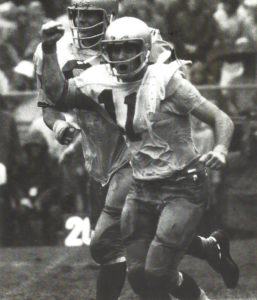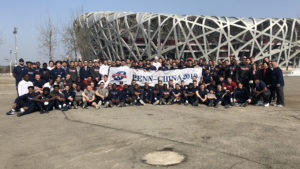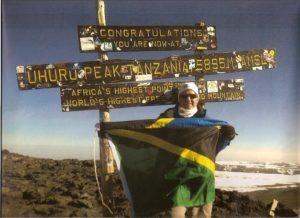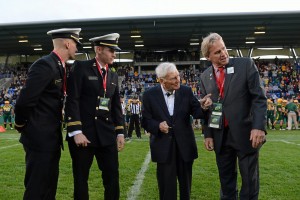The Intrinsic Value of International Travel
 SPORT HAS BECOME a global phenomenon. It connects fans worldwide and showcases international talent. It reflects not only the athletic performance, but the hard work, dedication and sacrifice required to achieve success. Patrick Steenberge, founder and president of Global Football, feels the value of international travel is found in developing leadership, creating a culture of appreciation, and enhancing teamwork.
SPORT HAS BECOME a global phenomenon. It connects fans worldwide and showcases international talent. It reflects not only the athletic performance, but the hard work, dedication and sacrifice required to achieve success. Patrick Steenberge, founder and president of Global Football, feels the value of international travel is found in developing leadership, creating a culture of appreciation, and enhancing teamwork.
International travel has been the overriding theme in Steenberge’s life, and through one man’s desire to pay it forward for a sport that gave him much, he poignantly shares the many ways student athletes glean from their participation – and parents, teachers, coaches and others who support them build a deeper awareness of the best possible education—travel. From what the Penn Quakers learned in China, to recognizing the leadership values travel creates in players; from learning to strike a spark in life to recognizing when a reward can far outweigh life’s inconveniences—Steenberge’s messages are clear.
What a University of Pennsylvania Team Learned in China
In March 2019, the University of Pennsylvania made history as the first Ivy League team to step out on the gridiron and win a bowl game in Shanghai. The opportunity provided many of the elements, which have long been the focus of Global Football: changing lives through understanding cultural differences and commonalities, bridging communication barriers with the “language” of football, building life-time friendships that will span the globe, and having an extraordinary international experience. Steenberge applauds the University for taking a leap of faith… taking a leadership role and bringing the opportunity for a special kind of “growth” to the young men who made the Penn Quakers proud. He also expressed how amazed he was to see the growth of the game—the excitement for the sport in China so palpable with the coaches and players for a sport they call American football. The game isn’t under attack in China; everyone is looking beyond the concerns and seeing all the great parts of the sport… all the great things it does to benefit the coaches, the student athletes,
Recognizing the Innate Leadership Value in Athletes
 Student athletes are vital to our society, and the skills they learn through their sport come about because there is a unique quality in them—they are curious and inquisitive. Steenberge has found athletes generally go the extra mile as students. “They’re not just students—they are athletes spending a lot of extra time being students. Natural born leaders, they seek out more in life than to just get an A on their exams. They have an innate drive to do something else. Athletics give them an extra bit of excitement, a better understanding of setting goals, and a willingness to make the sacrifices. Training is hard—in any sport. Steenberg laughs as he shares his daughters’ belief, from their college swimming days, “If swimming were easy, it would be called football!” It is the dynamics of effort and commitment we see in student athletes who give it their all for practice, and then go give the same drive to study like other students.
Student athletes are vital to our society, and the skills they learn through their sport come about because there is a unique quality in them—they are curious and inquisitive. Steenberge has found athletes generally go the extra mile as students. “They’re not just students—they are athletes spending a lot of extra time being students. Natural born leaders, they seek out more in life than to just get an A on their exams. They have an innate drive to do something else. Athletics give them an extra bit of excitement, a better understanding of setting goals, and a willingness to make the sacrifices. Training is hard—in any sport. Steenberg laughs as he shares his daughters’ belief, from their college swimming days, “If swimming were easy, it would be called football!” It is the dynamics of effort and commitment we see in student athletes who give it their all for practice, and then go give the same drive to study like other students.
The innate curiosity in life, added to a passionate drive to do something bigger and better and to take on any new challenge is dynamic; that curiosity, that motivation, that inquisitiveness…it manifests itself when athletes land on foreign soil and experience a foreign culture. Different sights, sounds, flavors… athletes seem to take in on and say, “wow, look how unique this is, how different.” Players come from all walks of life. The team traveling for the University of Pennsylvania was a fascinating mix of backgrounds, cultures, races and abilities, but they were all bright academics who embraced China at the highest level possible. The story is told about the student’s time spent during the briefing with the State Department people at the U.S. Embassy in Beijing, that was set up by Steenberge. The event extended three hours; the State Department leaders were challenged by the quality of questions stemming from these bright young minds. What they brought to the table was developed to a heightened degree through the opportunity to travel overseas.
At many levels our student athletes are the picture of our future world and how their sport helps them emerge as leaders is significant. Steenberge says he has seen it, and heard from coaches, how travel brings out hidden skills and qualities. Players are transformed when they are in a different culture, a different environment that pushes at their comfort zone. Some get humbled, lose their confidence, and if once a leader, opt for a “followership” role. Others, whom coaches may see as quiet and reticent to step up on the field, rise up as leaders and surprise everyone around them. It seems that in a foreign country a new leader emerges; the control previously maintained by a certain false bravado is replaced by the quiet, cerebral type who has learned to “think” their way forward. This is where real-life dynamics fit and the coach who sees this transformation and works with the emerging leader when they get back home is to be applauded.
Striking the Spark of Life
 There are so many life lessons someone like Patrick Steenberge can provide young athletes. One is his general outlook on life, which surfaced during the filming of Beyond the Game, and is founded on his insatiable thirst for LIVING every day, “there’s a great saying in Spanish, la chispa de la vida—you know—the spark of life!” He fills each day with figuring out how to get another group bold enough to take the risk of an adventure—think of it: a gridiron on Antarctica!
There are so many life lessons someone like Patrick Steenberge can provide young athletes. One is his general outlook on life, which surfaced during the filming of Beyond the Game, and is founded on his insatiable thirst for LIVING every day, “there’s a great saying in Spanish, la chispa de la vida—you know—the spark of life!” He fills each day with figuring out how to get another group bold enough to take the risk of an adventure—think of it: a gridiron on Antarctica!
Global Football is the essence of the spark of life; it is fundamental to a program uniquely designed to keep the sport in the mind and heart of a man who loves it sufficiently enough to use it as a platform to transform lives. It embodies the quest for young players who had never really considered the value of international travel to look for a work-study program in Spain, or help coach in Brazil because some other experience had inspired them to do so.
There are so many unknowns in travel that prevent people from making the trek… a different culture, an unknown language, and sites unknown. Traveling with a team, the coaches and players often” climb a hill” and see something that sparks them. They learn something about a country, a culture, a language, a sport, but more importantly—they learn something about themselves. For many of these young athletes, such a trip gives them a context of something bigger than themselves; it puts a spark into life’s next level, at a very important point in their lives. The experience of being in a foreign country, such as the athletes from the University of Pennsylvania had can never be found through reading books or seeing the land in photos or films.
Babe Ruth has been quoted, “Never let the fear of striking out get in your way.” He brings awareness to the reality that there is something “self-expanding” to know you have experienced a country like China, Ireland, France, Brazil—yet you were privileged to learn it without fear or hesitation through the support of a team, and the leadership of your athletic directors who act as guides and coordinators. They provide the encouragement to do some things independently that creates a spark when an athlete says, “Hey, I want to go do more of this. I want to see more! I want to do some more!” One of the stories Steenberge shared in the film is of a young man who was not all that happy about going to the Louvre in Paris and viewing the Mona Lisa. Some years later the young man called to share he had just gotten married and what he learned on that trip enabled him to meet and marry the girl of his dreams. Asking how it happened, Steenberge was reminded of the Louvre experience, and inspired by the artwork, the young man was marrying an artist who was impressed at his awareness and experience. The greater message in this story is that young athletes don’t know what they don’t know, and in some ways count on others to somehow lead the way for them; and what a pleasure for those of us who care enough to offer a little “influence.”
When the Reward Outweighs the Inconvenience
 When Steenberge took the team to China, the players had to be reminded that life has its little inconveniences, and that anything about which you are passionate, or where you choose to succeed, will be rife with challenges. Some of the kids were feeling disconcerted about the length of the flight. In his sage wisdom, the response was, “Don’t worry about the flight! It’s just a small inconvenience for the knowledge and experience you’re going to get.” Steenberge says the message he wanted to convey was to make a decision to do something, and then figure out the best way to do it. Anyone can sit at home and eat bon-bons on the couch; an athlete would never settle for that. They understand the need to get up early, get dressed in a proper way, and do many things that are not always convenient. To take on the challenge of an international trip, knowing you have to sit in an airplane when you are six-foot-four and 260 pounds might not be overly comfortable, but…what a small inconvenience to hike the Great Wall of China, climb to the top of Mount Kilimanjaro, or work in an orphanage.
When Steenberge took the team to China, the players had to be reminded that life has its little inconveniences, and that anything about which you are passionate, or where you choose to succeed, will be rife with challenges. Some of the kids were feeling disconcerted about the length of the flight. In his sage wisdom, the response was, “Don’t worry about the flight! It’s just a small inconvenience for the knowledge and experience you’re going to get.” Steenberge says the message he wanted to convey was to make a decision to do something, and then figure out the best way to do it. Anyone can sit at home and eat bon-bons on the couch; an athlete would never settle for that. They understand the need to get up early, get dressed in a proper way, and do many things that are not always convenient. To take on the challenge of an international trip, knowing you have to sit in an airplane when you are six-foot-four and 260 pounds might not be overly comfortable, but…what a small inconvenience to hike the Great Wall of China, climb to the top of Mount Kilimanjaro, or work in an orphanage.
Unfortunately, there are people who just don’t want to take a risk, or be faced with any kind of inconvenience. Comfort is their style. A successful athlete chooses instead to be challenged, take on a few inconveniences, do some things that are difficult. They got the memo, “The rewards are so incrementally huge that it far outweighs any inconvenience”. Sometimes, we all need to be reminded of that concept; sometimes an athlete is treated a bit like royalty and shifts into an attitude that may need a little adjustment. So what if you have to sit for 12 hours… when you get off that “boat” you will be in Beijing, China!
Look Beyond the Imaginable
 Steenberge knows the value in international travel, from a personal perspective in what it has done for him—and for Global Football. He figured out a way to get back into football, and pay forward all the sport had given him—from an education at the University of Notre Dame, travel, playing in amazing coliseums, being part of a team, playing in the Cotton Bowl, and assuaging his anger over a sports injury that set his life on another path—with a little thought that has grown far beyond the imaginable.
Steenberge knows the value in international travel, from a personal perspective in what it has done for him—and for Global Football. He figured out a way to get back into football, and pay forward all the sport had given him—from an education at the University of Notre Dame, travel, playing in amazing coliseums, being part of a team, playing in the Cotton Bowl, and assuaging his anger over a sports injury that set his life on another path—with a little thought that has grown far beyond the imaginable.
It took 20 years for that anger to morph into something positive, and travel was the vehicle. He doesn’t count himself a big visionary; Steenberge just “Kinda came up with this global football idea to give student athletes a chance to travel too. But that’s about really as far as I thought of it. I made a commitment to try it, got first one high school and then another to see the intrinsic value for their athletes, and it took on a life of its own.
The message he has for young athletes is to know how a little “spark of life” inspired one person to impact tens of thousands of athletes, coaches, and parents. There is no ego in having this influence, in fact, it is rather humbling to think of the places you might go. And when you lean into the risk, and “get after it” you can look back on the cultures you experienced in Tanzania, Austria, Spain, or Tokyo… where ever your travels lead. Just know your experiences will far exceed your dreams and plans. People may think you’re “wacky” like they did Steenberge when he first mentioned he wanted to take a team to Tanzania. In fact, he may still get the same look when he starts putting it out there that he wants to do a game in Antarctica. We hear him say, “I don’t know that it will ever happen, but I am going to take the risk. It is possible—there are flat areas, and football fields anymore are just basically a carpet. We could put it on a ship, and get it down there and then take a squad from America and maybe a squad from Argentina or Chile or Australia.” This is a dream that may never happen, but if Steenberge “gets after it” you can be sure a lot of people will be thinking they would like to see a drone shot of their logo at midfield with two football teams on an Antarctic base.
Beyond the game, athletes look at fulfilling other big dreams. They will have experienced a lifetime of possibilities in some of their international travel, and it will require but a few words of encouragement, counsel and advice to play possibly the biggest game of their life. Steenberge offers two thoughts:
Just show up every day; show up and do something!
Get after it!
These are combined from a philosophy he picked up through Yogi Berra, the old baseball guy who said, “When you come to a fork in the road, take it!” Don’t undervalue strategic planning, but don’t mull it over until your spark is gone. Just “get after it;” make adjustments if necessary; do it with a full commitment and go after it with all you’ve got. At the end of the day, Steenberge is a believer in forgetting all the reasons something won’t work and believe with all your heart the one reason why it will. He thinks of the leap of faith exhibited by the University of Pennsylvania and all that has transpired since it got behind his idea; he also reflects on a recent conversation with another University whose mindset is about the reasons why another similar travel event won’t work for its student athletes. There is something to be said for this philosophy, and the reality that if all you look at is the why-nots, the reasons why may never shine or be recognized. From Philadelphia to Beijing, and from Notre Dame to Ireland… each manifested from a spark of life and people willing to get after it!
The Dollar Dilemma
 There is no questioning the value of international travel for student athletes. The dilemma lies in how schools, students, and families fund that travel. It is the number one reason talented student athletes don’t get to participate in these trips or travel abroad. It is tough for everyone who has already stepped up to the plate to pay for the expenses related to a student’s education. It is equally difficult to understand the educational value of traveling overseas.
There is no questioning the value of international travel for student athletes. The dilemma lies in how schools, students, and families fund that travel. It is the number one reason talented student athletes don’t get to participate in these trips or travel abroad. It is tough for everyone who has already stepped up to the plate to pay for the expenses related to a student’s education. It is equally difficult to understand the educational value of traveling overseas.
Some might consider the shame of seeing corporate sponsors throwing a lot of money at events for other things that may well be worthwhile from a marketing standpoint—and rethink the overall intrinsic value of supporting an athlete to have a life-changing experience that will carry them beyond the game. In a world that grows increasingly tighter internationally, can there be a best benefit decision for companies to see the value of sponsorship as part of a uniquely competitive marketing platform? Branding, signage, tickets… Global Football, fortunately, controls these decisions and can easily provide a company with a vision to impact tens of thousands of people in a very positive way. What an opportunity to participate in leaders emerging through sport and team participation, and travel developing a life skill in relating to others on the field or off.
A Valuable Piece of Travel
 Steenberge has seen firsthand how education at some level dims the dreams of athletic directors and coaches who settle in, work the job, and look forward to retirement. It is a travesty for anyone in a leadership role to not recognize the trench into which they’ve unknowingly dug themselves, nor the impact that influence might have on athletes. Although with no deliberate intent, this failure to inspire or support players in the value of international travel tarnishes education.
Steenberge has seen firsthand how education at some level dims the dreams of athletic directors and coaches who settle in, work the job, and look forward to retirement. It is a travesty for anyone in a leadership role to not recognize the trench into which they’ve unknowingly dug themselves, nor the impact that influence might have on athletes. Although with no deliberate intent, this failure to inspire or support players in the value of international travel tarnishes education.
Traveling overseas is amazing; it is the best education you can ever get. What a student can do in a week in class can never compare with that same week spent overseas. One of the things Steenberge sees happen again and again is, “Everybody learns something very dynamic when they come back, especially from a place like China. I mean there’s things happening there, and you realize how blessed you are to be born in America. No matter how wonderful it is in Spain—you’re in Barcelona and see the beaches and other wonderful stuff—but you can’t get ice in a drink. It is a simple little thing, but it helps you realize how many other really amazing things there are about being American, which is why everybody in the world wants to come here.” It is this really valuable piece of travel that makes a student athlete realize the world is amazing, yet feel fortunate to be in America.
